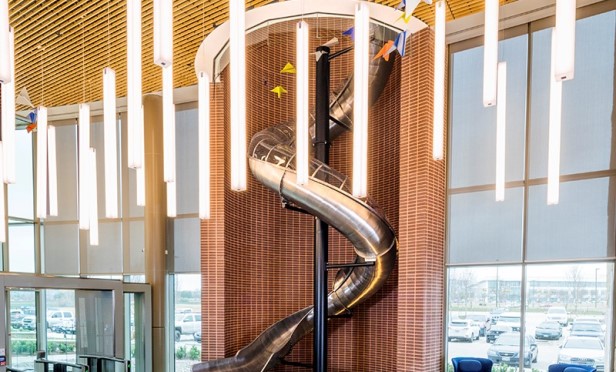 The Capital One office in Plano has a whimsical slide in its lobby (credit: Pascale Photography).
The Capital One office in Plano has a whimsical slide in its lobby (credit: Pascale Photography).
DALLAS—Today's professionals have high expectations when it comes to workplace design and the experience that companies create for employees. Not only does thoughtful office design encourage productivity and innovation, but it can even foster employee mental health and well-being, according to Capital One's 2019 Work Environment Survey.
The survey was conducted among 3,500 full-time office professionals from across the country including 500 respondents each from New York City, Washington, DC, Chicago, Dallas and San Francisco. The findings underscore the importance of flexibility and adaptability in workplace design and employees' schedules, especially as it relates to employee retention and satisfaction. The survey also found that across the board, urban professionals have higher expectations that employers will provide resources to support their mental health and well-being.
"Professionals today increasingly expect employers to examine the bigger picture of workplace design and their overall experience at the office," said Stefanie Spurlin, vice president of workplace solutions at Capital One. "The findings of the 2019 Work Environment Survey indicate that it's critical to remain adaptable when it comes to designing workspaces and amenities. Dynamic and adaptable spaces that not only accommodate various work styles but also foster employee well-being give companies an edge when it comes to helping people achieve better work-life integration that ultimately enables them to create better products and services for customers."
Key findings in Dallas─
Flexible schedules drive retention: Urban professionals want the flexibility to work when and how it suits them. Nearly all (85%) Dallas professionals list a flexible schedule in their top two reasons to stay with a company (up 10% from 2018).
Adaptable design is key: When it comes to physical workspaces, 81% of Dallas workers agree they work better when a workplace provides spaces for collaboration (compared to 77% nationally) and 90% agree they work better when they have space for focused, heads-down work (compared to 88% nationally).
Mental health matters: Nearly all (92%) Dallas professionals agree it's important for employers to create spaces and programs that support employee mental health and well-being, several points higher than the national response (87%).
"When asked which amenities would support mental health and well-being, the top responses were flexible schedules (79% compared to 66% national), access to natural light (64% compared to 53% national), on-site healthy food and beverage options (56% compared to 43% national) and quiet spaces for relaxation, rest or to unplug (52% compared to 42% national)," Spurlin tells GlobeSt.com.
Bringing the outdoors in: Connections to nature are more than just a design trend. Nature can improve employees' well-being and productivity at work. When asked to rank what kind of connections would help in those areas, 64% say a visual connection (windows, natural light) compared to 57% nationally, 50% say a physical connection (outdoor spaces for working, relaxation or socializing) compared to 45% nationally and 41% say a material connection (natural materials, indoor plants or water features) compared to 31% nationally.
Trending design elements: For the third year in a row, natural light is the most desired design element (67% up 6% from 2018). Other design elements professionals want to see include spaces for rest and relaxation (58%), individual work areas other than a traditional workstation or desk (49%), integration of natural/organic materials or elements in or just outside the building (40%) and collaborative spaces (30%).
© Touchpoint Markets, All Rights Reserved. Request academic re-use from www.copyright.com. All other uses, submit a request to [email protected]. For more inforrmation visit Asset & Logo Licensing.







